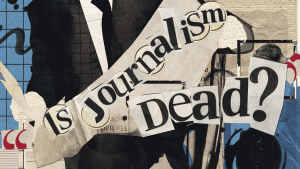 Last month, in a move that surprised many of us close to journalism, Warren Buffet bought newspapers – 63 of them, in fact.
Last month, in a move that surprised many of us close to journalism, Warren Buffet bought newspapers – 63 of them, in fact.
Now Buffet is not known for making high-risk or crazy investments. Quite the opposite. You know if Buffet is invested in something, you’d best get in on it, too.
So why 63 newspapers? And why weeklies and dailies whose headliner is the Richmond Times-Dispatch?
Because community papers are the most reliable segment of the business.
When I speak, I always ask the question, “How many of you still read your local paper, in paper form?”
Usually about half the room raises their hands; the other half reads it in digital form. But when posed a different way, most everyone in the room either doesn’t read the major dailies (New York Times, Wall Street Journal) or they subscribe only to the digital version.
Which, although a very small segment of the United States, goes to show community papers are still widely subscribed to and read.
In 2008, Washington Post columnist Erik Wemple profiled the Current Newspapers (a set of community papers in Washington, D.C.) publisher and editor, Davis Kennedy. Kennedy told him then:
Properties generated average advertising gains of 15 percent per year over the previous eight years.
When Kennedy was asked how those papers fared since then, he said:
Things aren’t quite so rosy but we are still in the black.
So the investment makes sense. Buffet likes those that are slow and steady increases year-over-year.
But What Does this Say About the Industry?
I think most of you would agree with me that this still seems a bit odd.
Warren Buffet, himself, said in 2009:
For most newspapers in the United States, we would not buy them at any price.
And now he’s buying newspapers claiming he’s:
Loved newspapers all my life — and always will…. Berkshire will probably purchase more papers in the next few years.
We already know he knows how to cut a deal and that he wouldn’t buy anything that isn’t already producing cash flow, but why small town newspapers?
What Does He Know that We Don’t?
The paywall.
In a letter to publishers and editors of the newly acquired newspapers, he wrote:
The original instinct of newspapers then was to offer free in digital form what they were charging for in print. This is an unsustainable model and certain of our papers are already making progress in moving to something that makes more sense.
If anyone can figure out the content paywall, it’s a Berkshire-Hathaway company, with the Oracle of Omaha at the helm.
This has been one that’s always bothered me. Why can’t we pay for premium content? Why do we assume it all has to be free?
Just like you, journalists have to pay their mortgages and they can’t do that if the publication they write for is giving away all of their content. Because, guess what? If they’re giving it away,they’re not making any money. And if they’re not making any money, they can’t pay their professionals. And if they can’t pay their professionals, those people can’t pay their mortgages.
See…it’s a vicious cycle and Buffet knows it can’t last.
While the New York Times and a few other major papers have tried the paywall, it’s pretty much failed. But Buffet knows there is something there. And you should too.